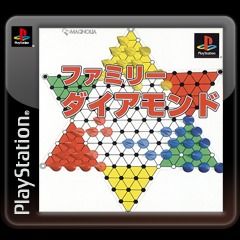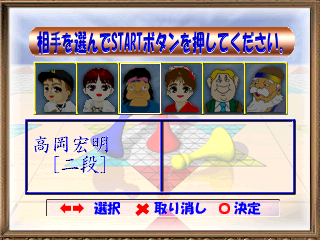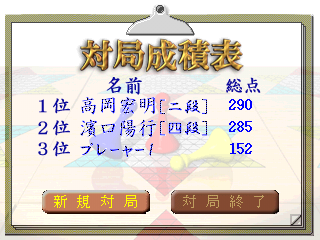Retro Replay Review
Gameplay
Family Diamond faithfully translates the classic rules of Chinese checkers into a digital format, preserving the core objective of moving all your marbles across the board to the opposite triangle. Each turn presents a straightforward choice: advance one marble into an adjacent space or chain multiple hops over neighboring marbles—your own or your opponents’—to maximize distance. This simple mechanic remains as satisfying in virtual form as it is on a tabletop, offering players a direct, strategy‐driven challenge with every move.
(HEY YOU!! We hope you enjoy! We try not to run ads. So basically, this is a very expensive hobby running this site. Please consider joining us for updates, forums, and more. Network w/ us to make some cash or friends while retro gaming, and you can win some free retro games for posting. Okay, carry on 👍)
The game supports multiple modes to keep sessions varied. You can face off against computer opponents with adjustable difficulty settings, from a casual beginner level up to seasoned AI that forces you to plan several moves ahead. Alternatively, Family Diamond offers a pass‐and‐play two‐player mode on the same device, recreating the social aspect of board gaming without requiring physical pieces. Although there’s no online matchmaking or network play, the local multiplayer option captures that familiar living‐room experience.
Controls are intuitive: a simple click or tap selects a marble, and a second input marks its destination. The board highlights valid moves automatically, reducing menu diving and letting you focus on strategy. If you’re new to Chinese checkers, an optional walkthrough explains the rules step by step, ensuring even novices can jump in quickly. Veteran players will appreciate the brisk pace—turns move smoothly, and there’s minimal downtime between moves, keeping the momentum high.
Graphics
Graphically, Family Diamond opts for a minimalist approach that mirrors the simplicity of the gameplay. The board is cleanly rendered, with clear, color‐coded triangles for each player and glossy marble icons that pop against the neutral background. While the visuals aren’t flashy, they are crisp and consistent, ensuring you never second‐guess which pieces belong to whom.
Animation is limited to subtle marble slides and simple highlighting effects, avoiding over-the-top transitions or distracting particle effects. This restraint helps maintain focus on the tactical aspects of each move. Frame rates are stable even on lower‐end hardware, and load times between matches are negligible, so you spend less time waiting and more time planning your next jump.
Sound design follows the same “less is more” philosophy: you’ll hear gentle ambient tones and a soft click as each marble moves. There’s no boomy soundtrack or grandiose fanfare—just enough audio feedback to make each action feel deliberate. If you prefer a quiet gaming session, you can even mute all sounds without impacting the user interface or visual clarity.
Story
Family Diamond doesn’t offer a traditional narrative or characters; it’s purely an abstract board game translated into digital form. For fans expecting a storyline or thematic progression, this minimalist presentation might feel underwhelming. There are no unlockable chapters or lore-driven campaigns—just pure, unadulterated strategy.
That said, the absence of a story can be viewed as a strength rather than a drawback. By stripping away narrative elements, the game places your decision-making front and center. Each match becomes a self-contained skirmish of wits, free from distractions or flavor text, which can be ideal for players who prize mechanical depth over plot-driven exposition.
If you’re someone who enjoys thematic context or character arcs, Family Diamond will not fulfill that itch. However, if you appreciate the elegance of an abstract challenge and the social tradition behind Chinese checkers, you’ll find the lack of story refreshing—it’s a reminder that sometimes simple rules yield the richest strategic possibilities.
Overall Experience
Family Diamond delivers exactly what it promises: a clean, faithful digital rendition of Chinese checkers that’s accessible to newcomers and engaging for longtime strategists. The straightforward interface and minimal distractions make it a quick pick-up for short sessions or extended battles of cunning. Whether you’re introducing the game to a friend on the couch or honing your skills against the AI, Family Diamond handles each scenario with ease.
On the downside, the game offers no bells and whistles—no online matchmaking, no unlockable skins or boards, and no extra game variants beyond the classic format. If you crave additional modes, daily challenges, or a progression system, you’ll need to look elsewhere. But for purists who want nothing more than the timeless feel of marbles hopping across a star-shaped board, this title is refreshingly focused.
Ultimately, Family Diamond is a solid pick for anyone seeking a no-frills strategy experience based on a beloved board game. Its simplicity is its selling point: there’s no learning curve, no cluttered menus, and no narrative detours. Just you, your opponent, and the timeless battle for board dominance. If that sounds appealing, you’ll find plenty to love here.
 Retro Replay Retro Replay gaming reviews, news, emulation, geek stuff and more!
Retro Replay Retro Replay gaming reviews, news, emulation, geek stuff and more!








Reviews
There are no reviews yet.